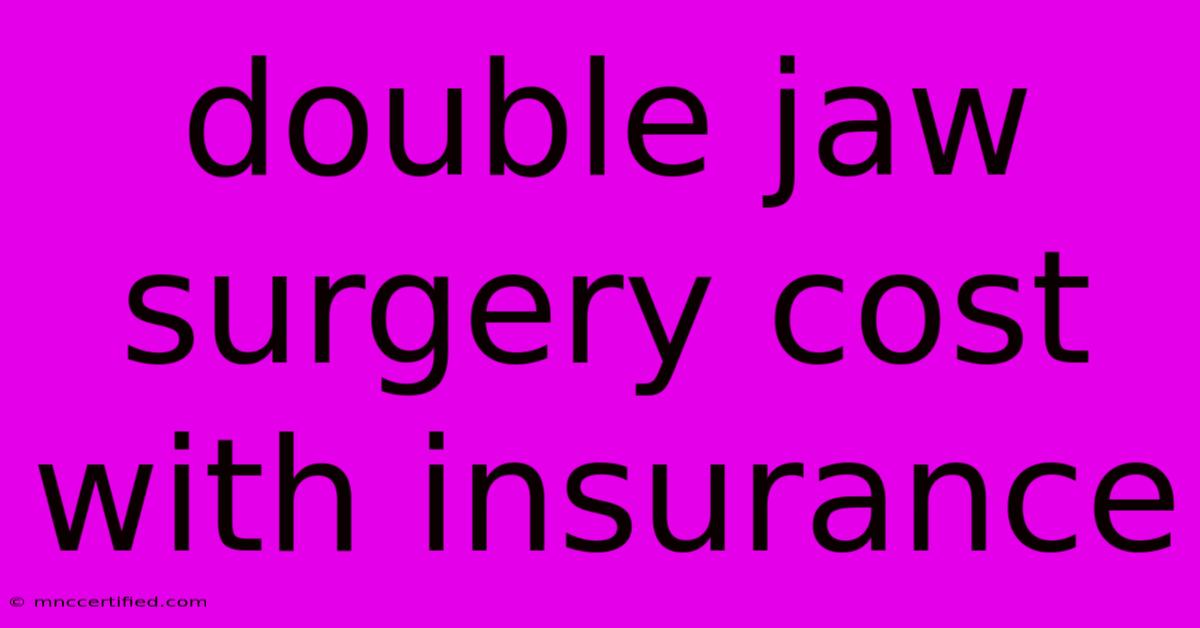Double Jaw Surgery Cost With Insurance

Table of Contents
Double Jaw Surgery Cost with Insurance: A Comprehensive Guide
Double jaw surgery, also known as orthognathic surgery, is a complex procedure that corrects misalignment of the jaw. While it can dramatically improve your facial aesthetics and oral function, the cost of this surgery can be daunting. This article will delve into the factors that influence the cost of double jaw surgery, explore the role of insurance coverage, and provide insights into navigating the financial aspect of this life-changing procedure.
Understanding the Cost Breakdown
The cost of double jaw surgery is a multifaceted issue, influenced by a multitude of factors. Here's a breakdown:
1. Surgeon's Fees: A significant portion of the cost is attributed to the surgeon's expertise and experience. Highly renowned surgeons with specialized skills and a proven track record often command higher fees.
2. Anesthesia and Hospital Fees: The costs associated with anesthesia, operating room time, and hospital stay vary depending on the facility's location and type.
3. Pre and Post-Operative Care: This includes consultations with specialists like orthodontists, consultations with the surgeon, and post-operative appointments for recovery monitoring.
4. Dental Appliances: Depending on your specific needs, you may require braces, retainers, or other dental appliances before and after surgery.
5. Medications: Prescriptions for pain relief, antibiotics, and other post-operative medications will add to the overall cost.
6. Travel and Accommodation: If you're traveling to a different city or state for surgery, travel and accommodation costs will be a factor.
7. Potential Complications: While rare, unforeseen complications might arise, requiring additional procedures and increasing the overall cost.
Insurance Coverage and Considerations
While double jaw surgery can be a significant financial burden, insurance coverage can provide crucial support. However, insurance policies vary widely, and there are key factors to consider:
1. Policy Type: The type of insurance you have (e.g., PPO, HMO) can influence your coverage.
2. Pre-existing Conditions: If you have pre-existing medical conditions, your insurer may consider them in determining coverage.
3. Medical Necessity: Insurance typically covers procedures deemed medically necessary. Your surgeon must provide detailed documentation and justification for the surgery, emphasizing its impact on your health and well-being.
4. Coverage Limits: Your policy might have limits on the amount covered for surgical procedures.
5. Deductibles and Co-pays: You'll need to meet your policy's deductible and co-pay requirements.
6. Pre-Authorization: Most insurance companies require pre-authorization for major procedures like double jaw surgery.
Minimizing Costs and Payment Options
Several strategies can help you manage the costs associated with double jaw surgery:
- Consult with your insurance provider early on: Discuss your coverage details, medical necessity documentation, and pre-authorization process.
- Explore financing options: Medical loans and payment plans can help spread the cost over time.
- Shop around for surgeons and facilities: Compare fees and services offered by different healthcare providers.
- Consider dental financing options: Some dental providers offer financing plans specific to dental procedures.
- Prepare for post-operative expenses: Plan for potential out-of-pocket costs related to medication, follow-up care, and potential complications.
Conclusion
While double jaw surgery can be a substantial financial investment, it's crucial to understand the cost factors, navigate insurance coverage effectively, and explore available options to minimize the burden. By being proactive and informed, you can make informed decisions and access the best possible care without overwhelming financial stress. Remember, your health and well-being are paramount, and seeking professional guidance from your surgeon and insurance provider is essential throughout the process.

Thank you for visiting our website wich cover about Double Jaw Surgery Cost With Insurance. We hope the information provided has been useful to you. Feel free to contact us if you have any questions or need further assistance. See you next time and dont miss to bookmark.
Featured Posts
-
2027 Rugby World Cup Boks And Irelands Path
Nov 09, 2024
-
Conifer Insurance Company Phone Number
Nov 09, 2024
-
Tomorrows Wincanton Two Value Bets
Nov 09, 2024
-
Rapper Bhad Bhabie Confirms Cancer Diagnosis
Nov 09, 2024
-
Carolinas Choice Insurance Agency Llc
Nov 09, 2024